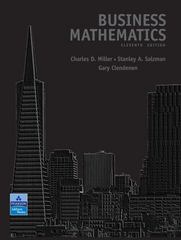Question
1.Briefly discuss the five asset classes in Table 1. Using the data from Table 1, calculate the Arithmetic Mean (AM), Geometric Mean (GM) and Standard
1.Briefly discuss the five asset classes in Table 1. Using the data from Table 1, calculate the Arithmetic Mean (AM), Geometric Mean (GM) and Standard Deviation () of returns of each of the five asset classes. Briefly discuss the risk-return characteristics of each asset class with reference to these measures.
2. Construct an efficient portfolio. Assume the risk-free rate over the period is 4.45%. Calculate the Efficient Frontier and Capital Allocation Line (CAL) for the five asset classes using the Excel Solver Tool (see prescribed Textbook Chapter 7, Appendix A for guidance). You will also need to calculate and provide the 'Bordered Covariance' and 'Correlation Matrices'. Discuss the implications of these five assets on efficient frontier and CAL.
3. Economic indicators are often used to predict the business cycle. Provide an outlook for the economy based on data showing that the index of consumer expectations has risen and the initial claims for unemployment insurance has fallen. Discuss the consequences of that from a portfolio management perspective, elaborating on the choice of assets from cyclical and defensive industries.
4. Using the Black-Scholes formula and the cumulative normal distribution (i.e. see Table 21.2, p. 740 of the prescribed textbook), compute the call and put option prices using the data from Table 2. First compute d1 and d2, then using Table 21.2 in the textbook, find the N(d)'s and use interpolation if needed to find the exact call and put prices.
5. Assume the current futures price for platinum for delivery 10 days from 23 March is AUD$1,260.49 per ounce. Suppose that from 24 March 2017 to 6 April 2017 the platinum prices were as in Table 3. Assume one futures contract consists of 100 ounces of platinum. Also, assume the maintenance margin is 5% and the initial margin is 10%. Calculate the daily mark-to-market settlements for each contract held by the short position. Briefly discuss basis risk (i.e. you can give an example if it makes it easier to discuss) [Hint: see Chapter 22 and examples 22.1 and 22.2 of the textbook].
6 .Evaluate a fund's portfolio performance in terms of the market (e.g. outperformance or underperformance) using the Sharpe ratio, Treynor measure, Jensen's alpha and the Information ratio using data from Table 4. Assume the risk-free rate is 4.45%. Briefly discuss each of the four measures plus the Morningstar risk-adjusted return model.
Step by Step Solution
There are 3 Steps involved in it
Step: 1

Get Instant Access to Expert-Tailored Solutions
See step-by-step solutions with expert insights and AI powered tools for academic success
Step: 2

Step: 3

Ace Your Homework with AI
Get the answers you need in no time with our AI-driven, step-by-step assistance
Get Started


